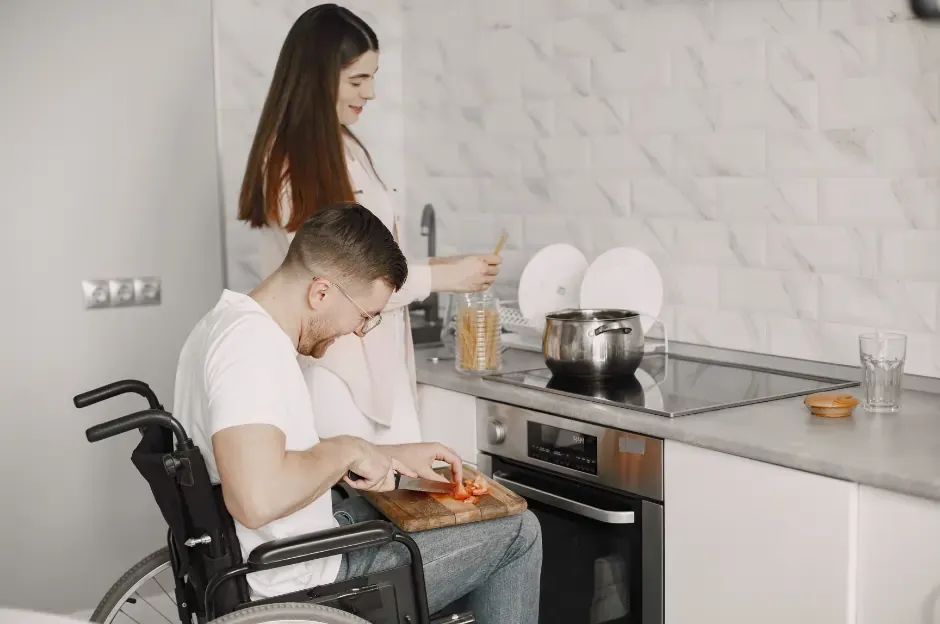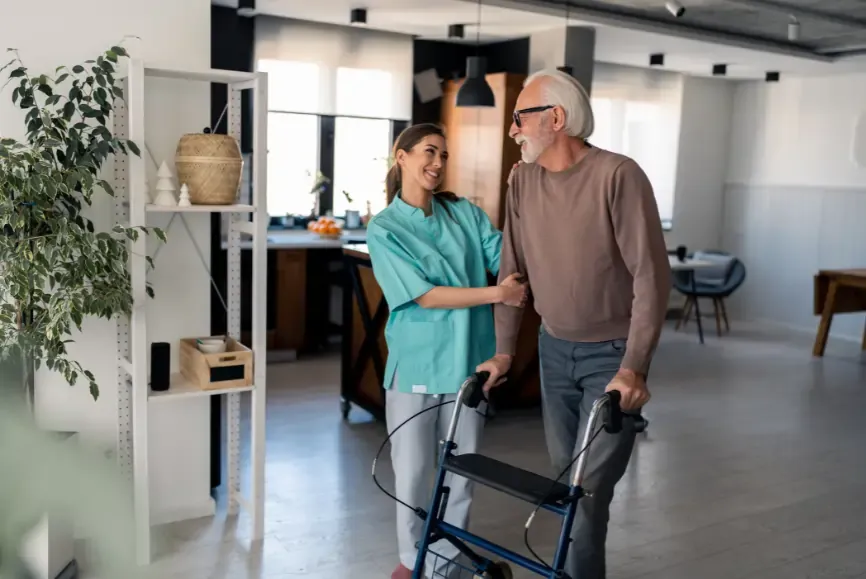Builders & Renovations FAQs
The Impact of Proper Home Modifications on Quality of Life
Making changes to a person’s home can significantly improve their quality of life, especially if they experience mobility challenges, disability, or are aging. Home modifications, when done correctly, can increase independence, safety, and comfort. We’re going to look into the advantages of home modifications and how they can enhance a person’s overall wellbeing and quality of life.
Home modifications reduce hours of care provided by 42% per week*
What are Home Modifications?
Home modifications are custom built changes made to a home to make it more accessible and safe. These can range from simple adjustments like grab bars in the bathroom to more complex renovations like widening doorways for wheelchair access, installing ramps, or even relocating laundry facilities.
The goal for home modifications is to create a living space that supports a person's specific needs and promotes their wellbeing, whether they have a disability, are aging, or have other functional limitations.
The NDIS defines home modifications as, ‘changes to the structure, layout or fittings of a participant’s home so they safely access it and move around comfortably in areas they frequently use’
Examples of common home modifications include:
- Bathroom Modifications: Grab bars, raised toilet seats, walk in showers or baths, non slip flooring, hand held showers, roll in showers, bath seats.
- Kitchen Modifications: Adjustable countertops, pull out shelves, accessible appliances.
- Bedroom Modifications: Adjustable beds, grab bars, improved lighting.
- Accessibility Modifications: Ramps, widened doorways, stairlifts, elevators, wheelchair accessible doors.
- General Home Modifications: Improved lighting, lever door handles, removal of trip hazards, handrails, deadbolts, relocated laundry facilities.

How Home Modifications Improve Quality of Life
Research consistently shows that home modifications have a positive impact on quality of life. Here are some key benefits:
Increased Independence
Modifications empower individuals to perform daily tasks with greater ease and confidence, reducing reliance on caregivers and promoting self sufficiency. This can include activities of daily living (ADL) like bathing, dressing, cooking, and moving around the home. Increased independence contributes to a stronger sense of self worth and control.
Enhanced Safety
Modifications can reduce the risk of falls and other accidents. Features like grab bars, non slip flooring, and improved lighting create a safer environment, giving individuals and their families greater peace of mind. This is particularly crucial in areas like bathrooms and entrances.
Greater Comfort
A home adapted to individual needs is simply more comfortable. Modifications can mitigate specific challenges, such as pain management or difficulty with specific movements, leading to a more relaxed and enjoyable home experience.
Improved Mental Wellbeing
The ability to live independently and safely at home has a significant positive impact on mental health. Reducing stress related to mobility and accessibility can lead to improved mood, reduced anxiety, and a greater sense of overall wellbeing. When people feel safer and more comfortable in their own homes, it can positively affect their mental wellbeing and increase their independence.
Support for Aging in Place
Home modifications enable people to remain in their homes as they age, rather than having to move to assisted living facilities. This allows people to maintain their social connections, routines, and sense of belonging within their communities.
Reduced Reliance on Caregivers
When individuals can manage more tasks independently, it can reduce the burden on family members or other caregivers. This can improve relationships and create a more supportive environment for everyone involved.
Improved Social Participation
When people have greater independence and comfort in their homes, they are more likely to socialise and engage in activities outside the home.
Reduced Physical Strain
Home modifications can reduce physical exertion and make daily tasks less physically demanding, allowing people to have more energy to engage in other activities.
Planning for Home Modifications
It's important to carefully plan any home modifications to ensure they meet the specific needs of the individual. Consulting with healthcare professionals, occupational therapists, and qualified builders or contractors is crucial.
They can provide expert advice on the most appropriate modifications and ensure the work is carried out to a high standard. The home modification process typically involves:
- Assessment: A professional, such as an occupational therapist, assesses the individual's needs and the home environment.
- Planning: Based on the assessment, a plan is developed to address the specific accessibility and safety issues.
- Implementation: The modifications are carried out by qualified NDIS building professionals.
- Evaluation: After the modifications are completed, the impact of the changes are evaluated.

The Importance of Custom Home Modifications
It is vital that home modifications are tailored to the individual's specific needs and preferences. A standardised approach may not address all the unique challenges faced by a person, and may even be detrimental.
When people are actively involved in the planning process it reinforces their sense of control over their environment. A participatory approach to the assessment and decision making process ensures that the individual's priorities are heard.
Funding for Home Modifications
Depending on circumstances, there may be funding options available to assist with the cost of home modifications. Government programs, disability support schemes (like the NDIS in Australia), and charitable organisations may offer financial assistance. It's worthwhile researching available options and gaining professional guidance.
Conclusion
Home modifications are a vital investment in quality of life. By creating a safe, comfortable, and accessible living environment, these changes empower individuals to live more independently, maintain their dignity, and enjoy a better overall sense of wellbeing.
To discuss home modifications and improvements Symcorp can help implement, contact our friendly team today on 1300 043 012 or complete our online enquiry form.
References
Housing Design and Community Care: How Home Modifications Reduce Care Needs of Older People and People with Disability
NDIS - Home modifications explained
NDIS - Home and living supports
Home Modifications And Disability Outcomes: A Longitudinal Study Of Older Adults Living In England
